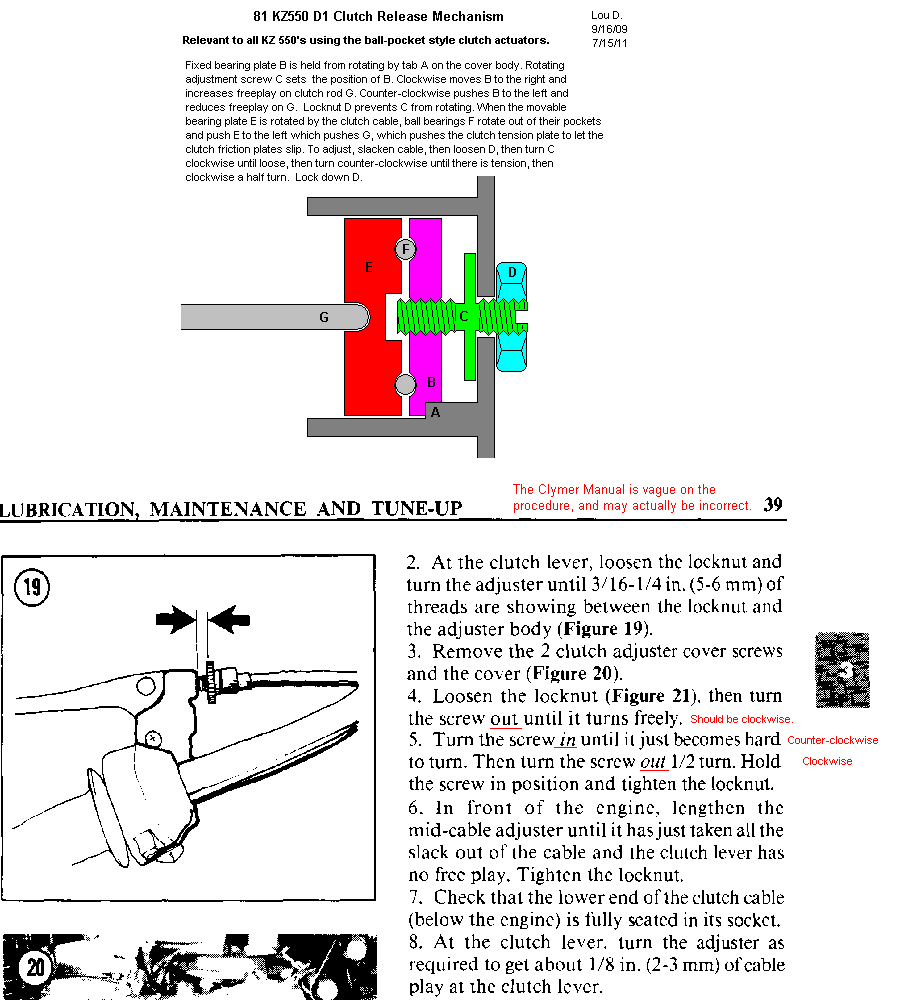- Posts: 232
- Thank you received: 8
'81 GPz 550 clutch slipping.
- MadShad
-
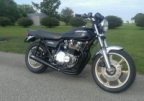 Topic Author
Topic Author
- Offline
- User
Shelbyville, Indiana. '80 KZ1000
No more of that talk or I'll put the leeches on you, understand?
Please Log in or Create an account to join the conversation.
- 650ed
-
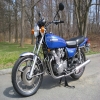
- Offline
- User
- Posts: 15344
- Thank you received: 2829
Earlier in this thread you stated "I've adjusted it by loosening the lock nut on the clutch adjustment, backing off the adjusting screw until I feel resistance and then screwing it back in 1/4 turn." That is the opposite of what either manual says to do because you do not "back off" the adjusting screw until you feel resistance. Backing off the adjuster makes it looser not tighter. and screwing it IN makes it tighter, so you do not screw it IN further once resistance is felt; you screw it OUT. Ed
1977 KZ650-C1 Original Owner - Stock (with additional invisible FIAMM horn)
Please Log in or Create an account to join the conversation.
- RonKZ650
-
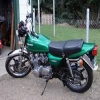
- Offline
- User
- Posts: 3702
- Thank you received: 240
321,000 miles on KZ's that I can remember. Not going to see any more.
Please Log in or Create an account to join the conversation.
- MadShad
-
 Topic Author
Topic Author
- Offline
- User
- Posts: 232
- Thank you received: 8
650ed wrote: OK. If you are turning it CLOCKWISE until it is hard to turn CLOCKWISE is turning it IN (tighter). If you then turn it COUNTERCLOCKWISE you are turning it OUT (looser).
Earlier in this thread you stated "I've adjusted it by loosening the lock nut on the clutch adjustment, backing off the adjusting screw until I feel resistance and then screwing it back in 1/4 turn." That is the opposite of what either manual says to do because you do not "back off" the adjusting screw until you feel resistance. Backing off the adjuster makes it looser not tighter. and screwing it IN makes it tighter, so you do not screw it IN further once resistance is felt; you screw it OUT. Ed
"Back off" = counterclockwise
"Screw it back in" = clockwise
I said I "backed it off" until i felt resistance.
Per the manual " counterclockwise until it becomes hard to turn"
Then I "screw it back in" 1/4 turn
Per the manual "turn clockwise 1/4 turn"
So you screw it IN or CLOCKWISE then set the locknut, I understand this is opposite of mist bikes.
Shelbyville, Indiana. '80 KZ1000
No more of that talk or I'll put the leeches on you, understand?
Please Log in or Create an account to join the conversation.
- SWest
-

- Offline
- Sustaining Member
- 10 22 2014
- Posts: 22972
- Thank you received: 2749
Steve
Please Log in or Create an account to join the conversation.
- loudhvx
-
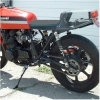
- Offline
- KZr Legend
- Posts: 10868
- Thank you received: 1616
The terms "in" or "out" really have no meaning since the screw does not move. It's shoulder stays against the cover surface. The only meaningful terms are CW and CCW.
The adjustment is more critical for the newer style actuator. The upside is that the design makes for an easier clutch to hold in. Once the balls roll out of their pockets, they do most of the holding for you. A sluggish cable will be a problem, though.
1981 KZ550 D1 gpz.
Kz550 valve train warning.
Other links.
Please Log in or Create an account to join the conversation.
- 650ed
-

- Offline
- User
- Posts: 15344
- Thank you received: 2829
So regardless of left handed / right handed; clockwise or counter clockwise; you still turn the adjusting screw IN - NOT OUT until you feel resistance; then you turn it OUT to give it some slack. You DO NOT "Back off" the adjusting screw until you feel resistance or "Screw it back in" after resistance is felt, because that is the opposite of what needs to be done. Backing off the adjusting screw implies making it looser as in screwing it OUT, and screwing it IN implies making it tighter. Maybe the OP doesn't fully understand that with left handed threads turning the adjuster screw counter clockwise is screwing it IN and turning it clockwise is screwing it OUT? Hopefully, anyone else reading this thread when looking for advice on adjusting the clutch will understand. Ed
1977 KZ650-C1 Original Owner - Stock (with additional invisible FIAMM horn)
Please Log in or Create an account to join the conversation.
- loudhvx
-

- Offline
- KZr Legend
- Posts: 10868
- Thank you received: 1616
Maybe you didn't see my post. The threads are standard right handed. The screw does not move in or out, so the terms mean nothing. Only CW and CCW have meaning here.650ed wrote: Correct. Reverse (left handed) threads.
So regardless of left handed / right handed; clockwise or counter clockwise; you still turn the adjusting screw IN - NOT OUT until you feel resistance; then you turn it OUT to give it some slack. You DO NOT "Back off" the adjusting screw until you feel resistance or "Screw it back in" after resistance is felt. Backing off the adjusting screw implies making it looser as in screwing it OUT, and screwing it IN implies making it tighter. Maybe the OP doesn't fully understand that with left handed threads turning the adjuster screw counter clockwise is screwing it IN and turning it clockwise is screwing it OUT? Ed
Please see the diagram I posted, or it won't make any sense.
The OP seems to understand it fine.
1981 KZ550 D1 gpz.
Kz550 valve train warning.
Other links.
Please Log in or Create an account to join the conversation.
- MadShad
-
 Topic Author
Topic Author
- Offline
- User
- Posts: 232
- Thank you received: 8
loudhvx wrote: Yes, oil level. In my experience, the time when a clutch begins to slip is right after an oil change. Even the manual states a high oil level will cause slippage, so check that first.
Also, in all of the 550 bikes I've owned or worked on, I have yet to find a clutch disk that measures below the service limit. I've also bought aftermarket disks that came thinner than old factory disks. So you likely won't need disks.
Steel plate warpage is not very common unless it's been run while slipping for many miles.
The springs do tend to lose some pressure over time. That is usually the only wear I can find.
Once you have the clutch apart you can do what I think is the single most effective thing I've done to the clutch:
If you notice, on the steel plates, one side is sharp and the other is rounded. If you stack them so all of the sharp edges face one way, the clutch tends to grab harder, but also has a harder time releasing. If you stack them the other way, the clutch releases nicely, but slips a bit more. I found an old set of plates and just very lightly rounded the sharp edges (interior teeth) with a wire wheel. That set worked best of all. It grabbed nicely and released just as nicely. It makes sense since the plates' teeth can move easier on the hub splines. I also did the other things you would consider, such as taking super fine grit and polishing the wear marks on the basket fingers and hub splines. This did help a little as well.
After going to pods and rejetting, I was still getting some major slippage. I ended up putting small shims under the springs. The heavier duty springs were just way too stiff for city driving.
After you check the oil level, you may want to double the check the clutch adjustment since it's easy to do. The manuals are vague/wrong for the newer type actuator.
Here's a link to some details on the clutch adjuster, in case you haven't already seen it:
gpzweb.s3-website-us-east-1.amazonaws.com/ClutchReleaseMech.GIF
I'll add it as an image, but you might need to download it to read it.
Shelbyville, Indiana. '80 KZ1000
No more of that talk or I'll put the leeches on you, understand?
Please Log in or Create an account to join the conversation.
- loudhvx
-

- Offline
- KZr Legend
- Posts: 10868
- Thank you received: 1616
1981 KZ550 D1 gpz.
Kz550 valve train warning.
Other links.
Please Log in or Create an account to join the conversation.
- undiablo
-

- Offline
- User
- Posts: 436
- Thank you received: 64
I believe Loudhvx is right 100%.
Kawasaki KZ 750/4 LTD 1981
Kawasaki KLR 650 2011
Argentina - Buenos Aires
Please Log in or Create an account to join the conversation.
- 650ed
-

- Offline
- User
- Posts: 15344
- Thank you received: 2829
undiablo wrote: Ed:
I believe Loudhvx is right 100%.
You, Loudhvx, and the original poster are all correct; I was wrong. I was looking at the Kawasaki Service Manual but not at the 1981 supplement within that manual, and the 1981 clutch adjustment is different than the earlier adjustment. PLEASE accept my apology. :blush: Ed
1977 KZ650-C1 Original Owner - Stock (with additional invisible FIAMM horn)
Please Log in or Create an account to join the conversation.

